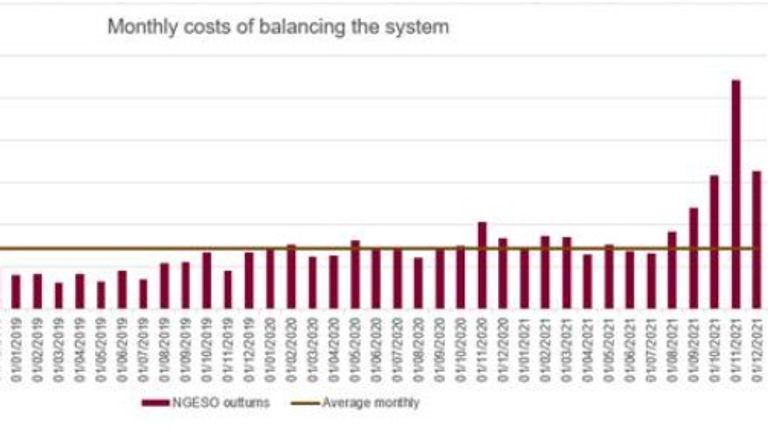
The power industry is concerned some companies could be making massive profits on the occasional days when renewable electricity generation slumps.
Generators which step up to fill those gaps are charging record prices to “balance” the supply of electricity as our power grid rapidly shifts towards net-zero.
The costs are paid by the industry, but are ultimately passed on to bill payers.
They make up only a few percent of the total cost of an electricity bill – but the extra burden is coming at a time when energy prices are already soaring.
The latest data, analysed for Sky News, shows consumers will end up paying a record £2.6bn on their bills due to the costs of balancing the electricity grid in 2021.
And it looks set to continue this year, with just one day last week costing more than £40m. Compare that to typical daily “grid balancing” costs of around £2m.
The high prices are in part due to the record high wholesale cost of gas, but there’s evidence that some electricity generators are charging much higher prices to increase generation on days when flows of electricity from wind and solar plants fall.
“The pricing seems very high compared to normal,” Darren Jones MP, chair of the business, energy and industrial strategy committee, told Sky News.
“What we need to understand is how much of that is related to the price of gas given the international gas crisis, and how much of that is due to potential bad behaviour of generators who are quite frankly taking the mick in order to make excessive profits.”
Ensuring a steady supply of electricity means engineers at National Grid ESO, which manages the grid, have to constantly work with generators to manage supply.
On days, or hours, when there is low wind, National Grid takes bids from suppliers to fill the gap through something called the “balancing market”.
But in recent months, balancing market costs have been rising exponentially.
Data shared with Sky News by energy industry analysts LCP found that the 10 most expensive days on record have all occurred since last September.
Overall balancing costs in 2021 were £863m more than in 2020.
In November 2021, the most expensive month on record, balancing costs were £541m – that’s nearly four times the monthly average.
On 24 January, a cold day, with virtually no wind, the bill for balancing the grid was £40.9m.
“We have never seen days like that before,” said Rajiv Gogna, an energy analyst at LCP.
Last November’s peak prompted the energy regulator Ofgem to write to energy companies about the issue. National Grid ESO has since launched a review of the market.
“We wanted to ensure the rules and mechanisms of that market were delivering competitive outcomes for consumers,” Fintan Slye, Director of National Grid ESO told Sky News.
One thing the review will examine is the timing and the cost of the “bids” made by power generators offering to take part in the balancing market.
Some generators, like England’s few remaining coal-fired power plants, are being paid up to £4,000 per MWH to balance the grid.
Even though that is around 16 times higher than the current wholesale electricity price, the costs are seen as justifiable due to their size. Most are coming to the end of their lives and don’t regularly supply electricity as coal is being phased out.
However, a number of smaller, cheaper-to-run gas powered plants have been following the price signal set by coal plants and charging similar amounts to generate electricity when supplies are short.
“They can bid in at whatever price they feel is appropriate or whatever price they think the market will bear, so it is a competitive market,” said Slye.
He told Sky News he expects the review should ensure the best possible deal for consumers but doesn’t expect it to find anyone “acting outside the rules.”








More Stories
Unlock Your Journey to Intelligent Wealth Management
Inspiring Change: Michael Bates Path to Entrepreneurship and Giving Back
Climate Token YES WORLD is now available for trading on top crypto change LaToken